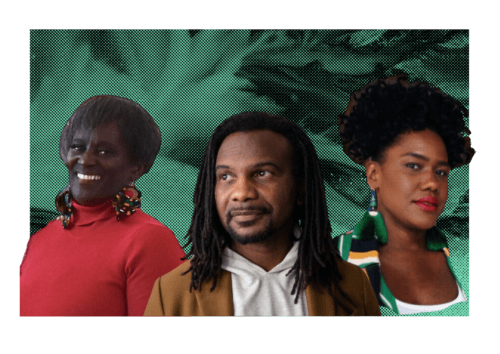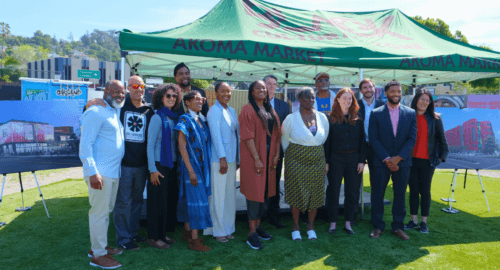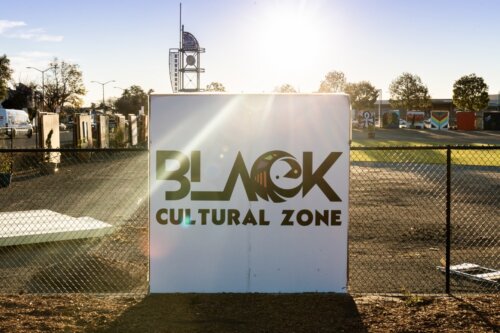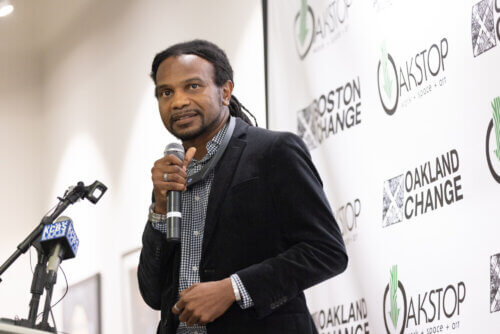Oakstop pt. 1: Stabilizing Space and Place

Oakstop team at the 1721 Broadway location ribbon cutting ceremony, May 2023
Developed in partnership between CAST & PJS Consultants
Interviews & content drafted by artist/writer dana e. fitchett with editing by CAST
This is part 3 of a 6-part blog series where we’ve spent time hearing from our partners in Oakland: Black Cultural Zone, Oakstop, and Betti Ono Foundation. Read why we’re highlighting these three Black Oakland natives and their remarkable work here.
About Oakstop and CEO Trevor Parham

Oakstop is an East Bay organization that uses commercial real estate as a platform for mobilizing communities of color, grounded in the idea of thinking about artists as entrepreneurs. Serving as work space, event space, and gallery space—across their several Oakland locations and with recent expansion into Richmond—Oakstop contributes to workforce development, entrepreneur ecosystems, and local creative economies. By investing in the power of place, worker power, cultural preservation, and equity for entrepreneurs, Oakstop celebrates, elevates, and holds space for Black creatives in Oakland in the context of ongoing displacement of Black community.
Founder and CEO of Oakstop, Trevor Parham, is himself an Oakland-born and -raised artist and entrepreneur. As an active member of the rich Black arts ecosystem in Oakland, he’s long been well aware of just how much talent is concentrated in the Town, and Oakstop gave him a way to center his professional work around this ecosystem.

“The whole concept for Oakstop from the outset came from the question: how do we stabilize and support the talent and keep it here in Oakland?” he shares. “Since the beginning, we’ve been saying, let’s focus on stabilizing artists by stabilizing space and place.”

Trevor elevates the tendency among artists and working class communities to condemn real estate, in large part because of the ways that systemic racism and other systemic -isms tarnish people’s perceptions of real estate as well as their experiences within real estate. He poses the question, “How do we harness instead of condemn real estate? My view is: let’s just get the real estate. But to help people feel less ostracized, we position ourselves as a social enterprise instead of a real estate or commercial real estate company.” Oakstop’s combined focus on real estate and arts and culture creates a natural synergy and alignment with our work at CAST.
Trevor’s Charge: De-risking Community Leadership

“My overall charge in the world right now,” Trevor says with clarity, “is to de-risk community leadership.” What he’s referring to with this phrase is finding ways for artists, organizers, and social entrepreneurs to thrive where they are, without having to leave their own communities due to unsustainable costs of living and inability to be compensated at levels that they deserve.
“Most of the talent from our communities leaves our communities cause there’s no money in serving our communities,” he says. “There aren’t enough jobs in that world that are compensating people for their experience and education such that it can be lucrative. If we can manage to bring in enough resources, we can close the talent gap and start to get more sustainable business models.”

He points to the current typical breakdown of community arts organizations’ business models as problematic. “Too many community arts orgs are 95% programming, 5% everything else,” he says. “We need to stop accepting that as the norm.” Oakstop is offering a model of a possible alternative. “People see us as a part of the arts community, Black-led, and they’re like, ‘This doesn’t look like what the narrative speaks to. How can they sustain?’ But the dynamic should be the opposite: so much of the budget should be going to staffing!” Trevor knows that a shift in the narrative can shift the dynamic as well. “We need to break out of this narrative that nonprofits are supposedly full of people who aren’t savvy in regards to business; this is a misperception due to the lack of financial investment in community work.”
Hear more from Trevor on the ways he’s carrying out his personal charge and how he’s partnering with CAST in next week’s story release.
Read the series
This six-part blog series was developed in partnership between CAST and PJS Consultants, with interviews and content drafted by artist/writer dana e. fitchett, and editing by CAST.
- Community Engagement
Recognize the Present to Repair the Future
An introduction to three Oakland partnership stories.

- Community Engagement
Black Cultural Zone pt. 1: A Demonstration of the Power of Hope
The story of Black Cultural Zone and Liberation Park.

- Community Engagement
Black Cultural Zone pt. 2: Reparations as Requisite for Reimagining
Working with BCZ and learning to take more risks.

- Community Engagement
Oakstop pt. 2: Building Legacy and Creative Ecosystems
CAST and Oakstop reimagining community spaces through creative ownership.

- Community Engagement
Betti Ono pt. 1: Building Cultural Permanence Through Art, Community, and Bold Leadership
Learn about how Betti Ono is redefining cultural belonging and empowering artists in Oakland.

- Community Engagement
Betti Ono pt. 2: Amplifying Black Voices in Oakland’s Cultural Ecosystem
Betti Ono Foundation’s partnership with CAST and the ongoing fight for equitable access to resources for Black cultural workers in Oakland.


About dana e. fitchett
dana e. fitchett is a trans-disciplinary artist whose practices are grounded in listening and cultivating new languages in service of alignment, integrity, and freedom. Within and outside of PJS Consultants, dana writes and edits for individuals and community organizations working for transformation and justice by way of truth and reconciliation. As Founder and Creative Director of dance collective, Movement for Liberation; teacher of her original Groovement classes; and in her visual art and transcription processes, dana works in and in conversation with the expressive legacy of the African diaspora. Also a novice music producer and practiced plant-based foodmaker, she holds a certificate in nonprofit management and leadership; a bachelor’s degree in urban studies; and a master’s of fine art in interdisciplinary art, and spends most of her time between Boston, Brooklyn, and Oakland.




